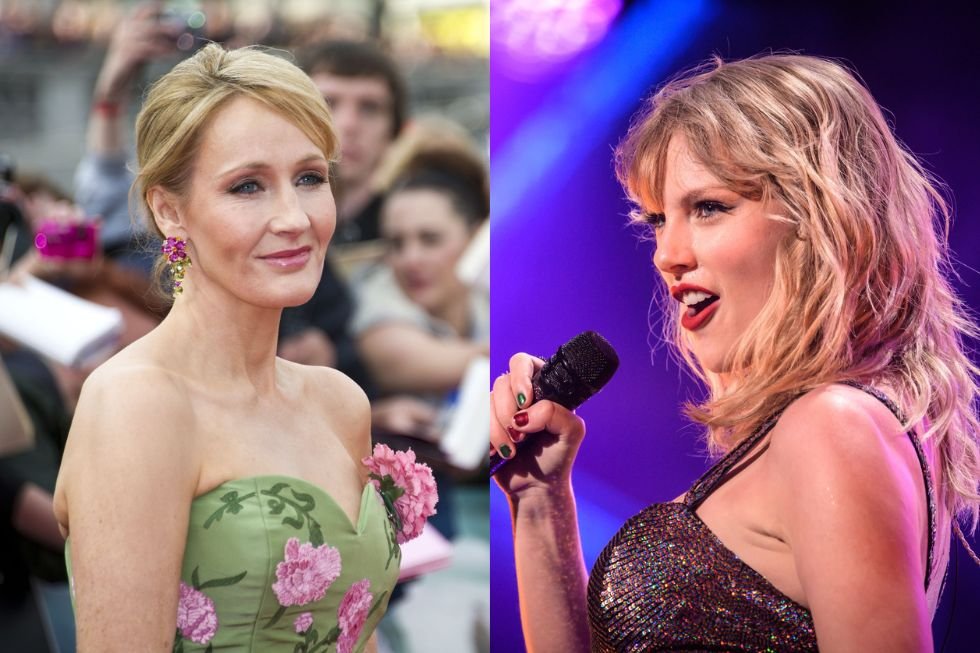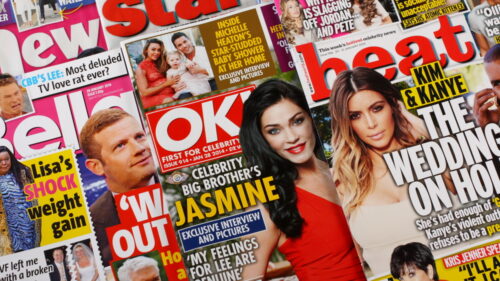Everything celebrities do, say or even think is subject to scrutiny. Not just their official output, like albums, concerts or books, but even their ideas, beliefs and values. The more acclaim they get, the greater the scrutiny. So, any celeb expecting not to receive a mega-tsunami of criticism at some point is in for a rude awakening. Condemnation and praise are both part of the celebrity equation.
Recently, two of the most influential women in the world have been under fire, not for the first time, but in a way that suggests they are now targets. We shouldn’t be surprised: No one reaches the altitude of American singer Taylor Swift or wields such cultural sway as British author J.K. Rowling without morphing into what Australians call a tall poppy: a person who is conspicuously successful and whose success frequently attracts envious hostility. All the same, Swift and Rowling must feel like they’ve been mugged by fate.
Death of a Showgirl
When Taylor Swift’s latest album, The Life of a Showgirl, dropped at midnight Eastern time — or five o’clock in the morning for British listeners — on October 3, it wasn’t so much a release as a global liturgy. Social media went dark for a moment, then exploded. Streaming platforms groaned under the weight of first-hour demand. The scale of anticipation was comparable to the premiere of Michael Jackson’s Thriller on December 2, 1983. In the streaming age, that kind of mass simultaneity is almost extinct. Swift revived it and succeeded in turning a piece of art into an event, an instant that millions of people felt compelled to witness in real time.
Yet within hours, the mood shifted. Critics, fans and detractors converged on X and TikTok with competing expositions and barbed judgments. The language was quite moral: her lyrics were “shallow,” her tone “smug,” her persona “calculated.” Others countered that the album’s apparent simplicity disguised a deft portrait of emotional exhaustion and self-awareness. Swift, they insisted, was no longer merely chronicling the relationship: She was deliberately dramatizing being misread. In doing so, she invited the very scrutiny that she’d previously escaped.
The sheer intensity of the reaction tells us something about Swift’s position in the cultural universe. She no longer belongs solely in the lineage of pop icons like Elvis, Madonna or the Beatles, all artists who revolutionized their genres. Swift has become a creative force whose work operates in the same register as Mozart, Picasso or even Shakespeare: Endlessly deconstructed, interpreted and repurposed by an audience that insists on seeing itself not as fans but as integral parts of her output.
Taylor’s lyrics are densely plotted, multi-charactered, imaginatively textured and woozily allegorical ruminations on love, moods and, it seems, pretty much everything else on the emotional spectrum of young women. Her songs are no longer personal confessions; they are public texts, polysemous and perpetually rewritten by collective opinion. But there are consequences.
Such scrutiny is both the cost and confirmation of greatness in the twenty-first century. Swift’s dominance has made her music inseparable from the moral, political and aesthetic debates that surround it. Each album now functions as a kind of referendum: Not just on her greatness, but on our own cultural values, such as sincerity versus irony, feminism versus fame, authenticity versus performance. The reaction to this latest release shows how fully celebrity has replaced theology — a system of belief and disbelief, faith and heresy, played out on a global scale.
The statue that came to life
Like Swift, her fellow traveller among masters of modernism, J.K. Rowling has become an icon: One with the perverse sway of the infallible that often, or perhaps always, comes with that status. Once the conjurer of a fictional universe filled with spells and sorcery, Rowling has since re-emerged as something stranger: a cultural contrarian who has left behind the safe realm of her own imagination to enter the more perilous environment of public morality.
Where Swift’s lyrics are dissected for hidden clues to her private loyalties, Rowling’s tweets and interviews are parsed like forbidden texts. Both women inhabit an arena where art and identity, opinion and orthodoxy collide — and where the penalties for misinterpretation can be swift, severe and global.
The dispute between Rowling and her onetime star, Emma Watson, has the character of a fabulous myth: A Pygmalion whose statue refused to stay marble and acquired a life of its own. Rowling didn’t simply write about Hermione Granger; she gave humanity to the actor who embodied her. Watson’s intelligence, integrity and, more problematically for Rowling, activism are almost living testaments to the author’s original conception. The trouble is that those echoes now reverberate far beyond the author’s reach. What began as a relationship of artistic possession has evolved into one of personal opposition: a prolific author confronted by the independent will of her own invention.
Rowling has often spoken of the intimate, even mystical relationship between author and character, but in Watson’s case, that bond is not just fiction. Rowling, it seems, didn’t merely write about Hermione Granger: she effectively magicked the actor who embodied her, or at least claims she did. Watson’s mind, fame and public presence were once inseparable from the role Rowling imagined. Small wonder, then, that when the two women diverged on questions of gender and identity, the disagreement carried the emotional heft of filial rebellion.
For Rowling, the heated exchange over womanhood has become a moral, not a semantic war, of words. Her insistence on the primacy of biological sex has alienated many former admirers, including Watson, who has championed a more inclusive view of gender. What might once have been a civil philosophical disagreement has hardened into a symbolic war, each side standing for a different conception of what it means to be a woman. Rowling, cast by her critics as an unrepentant transphobe, now exhibits her ostracism almost as proof of principle; Watson, now recast as the conscience of a younger, more progressive gender-fluid generation, responds with quiet but unmistakably angry defiance.
Victims of greatness
If there is tragedy as well as fascination in this, it lies in the destructive symmetry. Rowling, the author-cum-deity, breathes life into a character; the character’s embodiment grows up, acquires autonomy and ultimately challenges the authority of her maker. What began as a story about differences of opinion is now a kind of parable about power: who gets to define reality, the storyteller or the world she helped shape? What could be more entertaining for the legions of Harry Potter fans who have followed Rowling’s fiction like acolytes?
Two peerless, pre-eminent women, one a writer who conjured a universe anew from her imagination, the other a singer who built a mythology from her own experiences. Each has spent years, even decades, in a state of near-unchallenged ascendancy. Their output has defined eras; their names are signifiers for excellence and female empowerment. Both women have enjoyed the kind of global adulation that borders on worship — a condition that’s as intoxicating as it is precarious. When the applause is quieted and the disciples turn inquisitors, the criticism probably feels like betrayal.
Swift and Rowling aren’t victims of failure but of magnitude, eminence and greatness: when someone’s influence inflates so vastly, every expression, whether a lyric, a tweet or a throwaway remark, becomes public property. Swift’s heartfelt confessions and Rowling’s moral certitudes are annotated, pored over and endlessly reinterpreted as if they were theological texts. In a sense, they’ve become mirrors in which millions search for their own reflections.
At 35, Swift stands at the point where youthful omnipotence gives way to experience; Rowling, nearly 20 years her senior, inhabits a later stage of that same parabola. Both now confront an unfamiliar adversary: The scrutiny that attends not decline but grandiloquence. Each faces a culture newly suspicious of perfection and probably eager to unmask hitherto flawless idols.
[Ellis Cashmore’s Celebrity Culture is published by Routledge]
[Kaitlyn Diana edited this piece.]
The views expressed in this article are the author’s own and do not necessarily reflect Fair Observer’s editorial policy.
Support Fair Observer
We rely on your support for our independence, diversity and quality.
For more than 10 years, Fair Observer has been free, fair and independent. No billionaire owns us, no advertisers control us. We are a reader-supported nonprofit. Unlike many other publications, we keep our content free for readers regardless of where they live or whether they can afford to pay. We have no paywalls and no ads.
In the post-truth era of fake news, echo chambers and filter bubbles, we publish a plurality of perspectives from around the world. Anyone can publish with us, but everyone goes through a rigorous editorial process. So, you get fact-checked, well-reasoned content instead of noise.
We publish 3,000+ voices from 90+ countries. We also conduct education and training programs
on subjects ranging from digital media and journalism to writing and critical thinking. This
doesn’t come cheap. Servers, editors, trainers and web developers cost
money.
Please consider supporting us on a regular basis as a recurring donor or a
sustaining member.
Will you support FO’s journalism?
We rely on your support for our independence, diversity and quality.








Comment